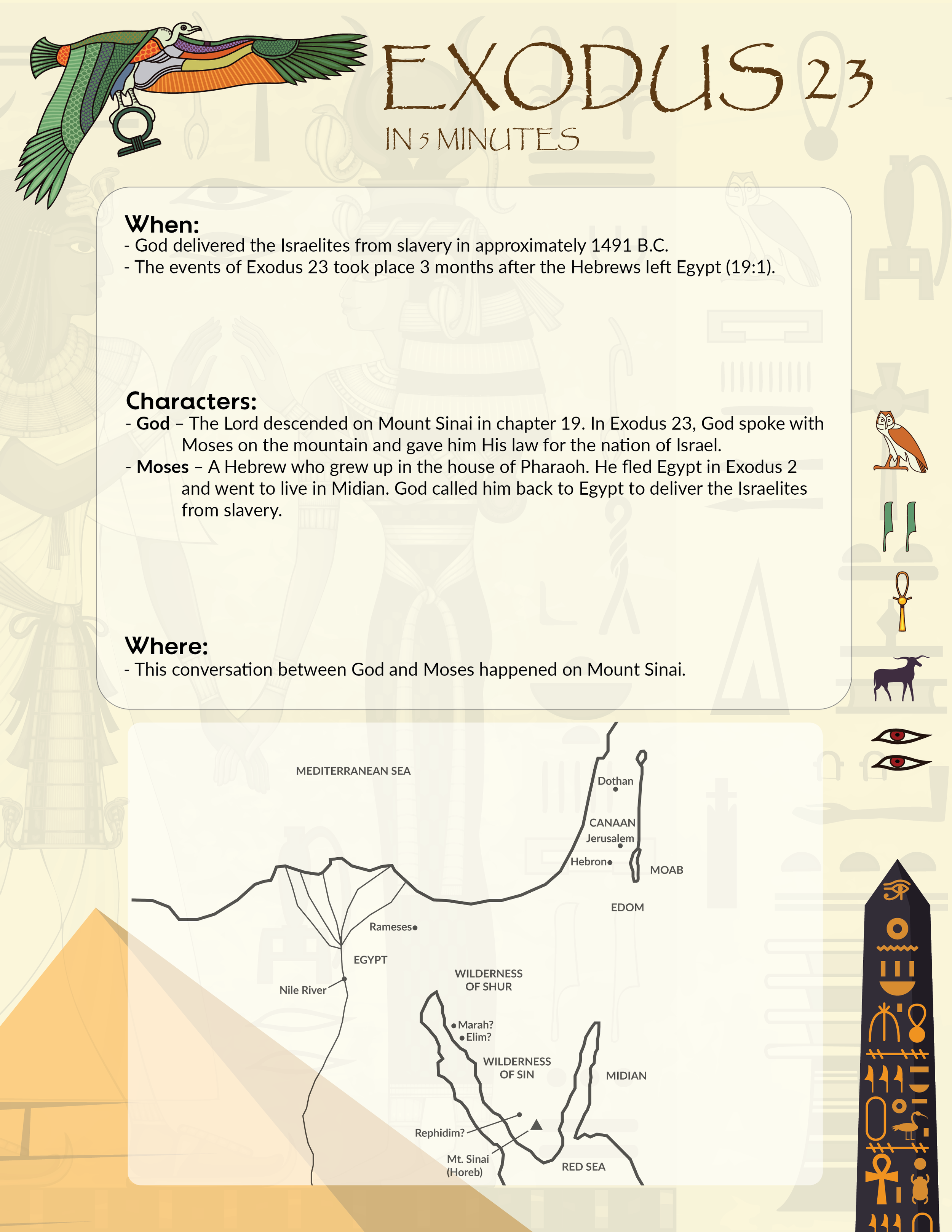Exodus 23 Summary: A Concise Overview in 5 Minutes
Exodus 23 Summary - A Quick Overview
WHEN:
God delivered the Israelites from slavery in approximately 1491 B.C.
The events of Exodus 23 took place 3 months after the Hebrews left Egypt (19:1).
CHARACTERS:
God– The Lord descended on Mount Sinai in chapter 19. In Exodus 23, God spoke with Moses on the mountain and gave him His law for the nation of Israel.
Moses – A Hebrew who grew up in the house of Pharaoh. He fled Egypt in Exodus 2 and went to live in Midian. God called him back to Egypt to deliver the Israelites from slavery.
WHERE:
This conversation between God and Moses happened on Mount Sinai.
OUTLINE:
UPHOLDING JUSTICE AND LOVING ENEMIES (23:1-9):
Exodus 23 is a continuation of the conversation between Moses and God that started in chapter 20.
God was revealing His laws for the nation of Israel.
The Israelites were not to corrupt the legal system by giving false testimony, taking bribes, taking advantage of the poor, or siding with a party based on personal preference.
They were instructed to help their enemies if they discovered them to be in need.
“If you meet your enemy's ox or his donkey going astray, you shall bring it back to him. If you see the donkey of one who hates you lying down under its burden, you shall refrain from leaving him with it; you shall rescue it with him.”
PERIODS OF SABBATH AND SACRED FEAST DAYS (23:10-19):
The Hebrews were to plant and harvest their fields, olive groves, and vineyards for 6 years, but on the 7th year they were to let them rest.
Likewise, they were to work 6 days of the week and rest on the 7th.
They were not to worship any foreign gods.
Three special feast days were to be held every year: the Feast of Unleavened Bread, the Feast of Harvest (beginning of harvest), and the Feast of Ingathering (end of harvest).
All the men of Israel were required to “appear before the Lord God” on these days and offer sacrifices (Deu 16:16).
GOD PROMISES TO GUIDE ISRAEL AND GIVE THEM THE PROMISED LAND (23:20-33):
God was going to send an angel (a messenger) ahead of the Israelites to guard them and lead them to Canaan. They were to obey everything he told them to do.
When they arrived in Canaan, God promised to gradually cast out the pagan inhabitants of the land.
If Israel would faithfully obey God’s voice, He would be their strength, defeat their enemies, give them abundant food, take sickness away from them, and cure their barren women.
The Israelites were not to assimilate with the Canaanites or worship their gods, lest they become a “snare.”
APPLICATION:
The fulfillment of some of God’s promises were dependent on the obedience of His people.
You’ll see these “conditional promises” all throughout the Old Testament.
The New Testament scriptures are also replete with calls for obedience.
As with the Israelites, both in their salvation from Egypt and their conquest of Canaan, it was God who supplied the power, but God expected their obedience.
Similarly, in the modern day, God’s power provides us salvation and the hope of entering a promised land (Heaven), but obedience is expected.
Anyone who tells you you can trust in God’s salvation while largely ignoring His commands isn’t presenting the message of salvation accurately.


